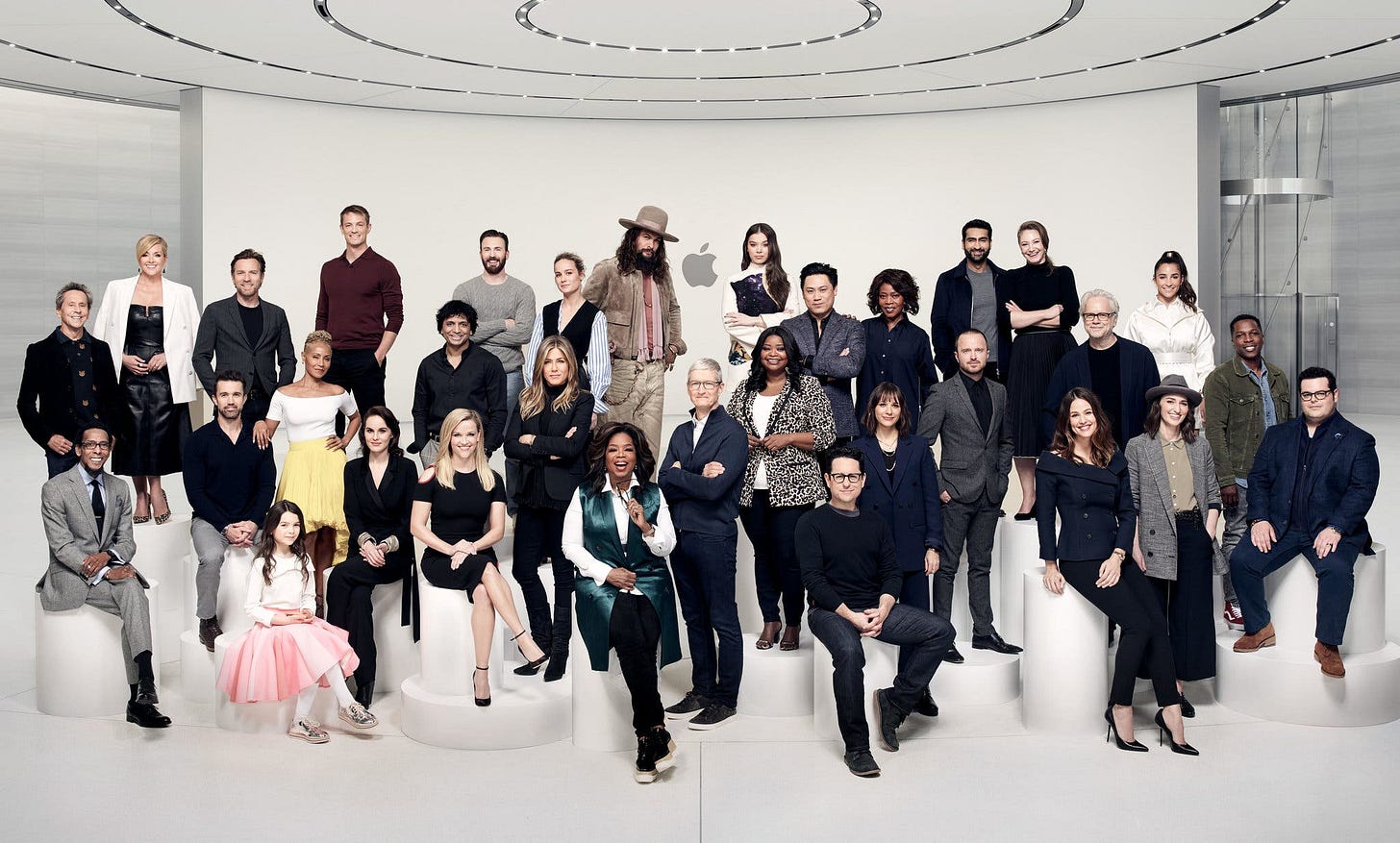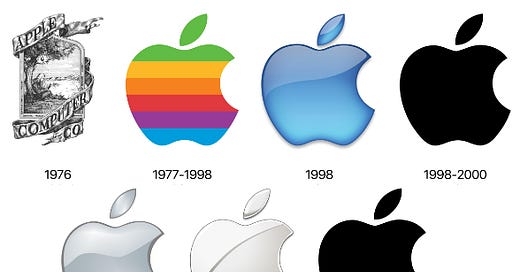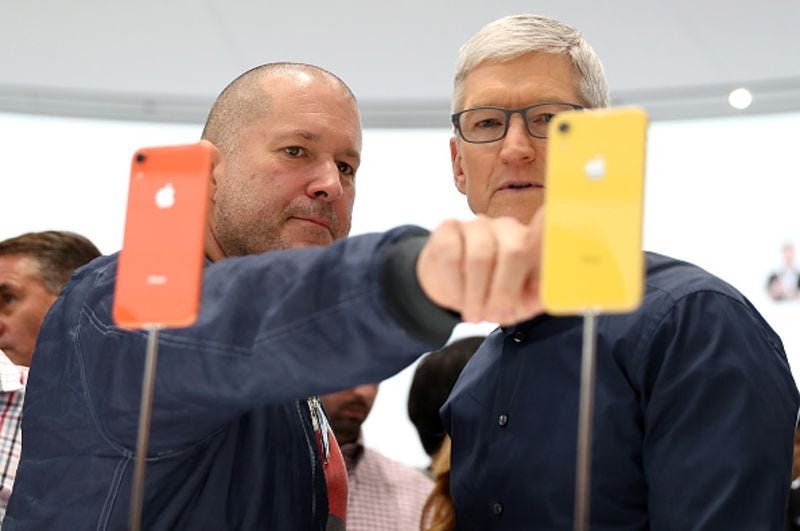Apple Part 1: From Jobs to Cook, iMac to iCloud
The largest company in the world already dominates consumer electronics and is now going after services.
Some updates
“Business” update
Thank you, Alicia, for the awesome logo! I’m concerned the design’s professionalism will be considered false advertising. All legal inquiries should be sent to Steven.Chizen@chizenlaw.com
“Personal” update
Speaking of “professional”. I received feedback (from long-time friend, first-time reader Phil Heller) that some readers would be more invested in my newsletter if they knew more about me. While I’m skeptical, here goes…
The best thing I did since my last post was a 10-day trip in India for Alina and Tushar’s wedding. First, India is truly its own continent. Of the oldest civilizations, it is probably the most isolated, less globalized than anywhere else I’ve visited. Most languages, including Hindi, descend from Sanskrit and are not spoken anywhere else. The dominant religion, Hinduism, is also largely limited to India, as are most of the resulting traditions and norms – especially the respect for animals. Overall, for better or worse, you see less McDonalds, NBA, or — Apple.
Second, civilization is long. India today reflects the influence of once dominant powers: the Greeks (Alexander the Great), Persians, Afghans, Mughals. And when the British first arrived in the 16th century, India was responsible for 25% of global GDP (vs. 3% today).
Third, speaking of that, India is at a crossroads, and I will be interested to see where it goes in my lifetime: stalling economy or the next China, diverse democracy or Hindu nationalist autocracy, US/Europe ally or Putin/dictator enabler.
While there, I read The Anarchy by William Dalrymple, great take on how lack of government regulation allowed a company, the East India Company, to gradually drag the British Empire into an unnecessary and deadly colonization.
I just started Stephen Platt’s Imperial Twilight about the Opium Wars; it’s proving to be an interesting comparison (30 pages in). Will update.
Intro
I wanted to write about Apple after (now not so) recently reading After Steve: How Apple Became a Trillion-Dollar Company and Lost Its Soul. Turns out it’s a massive and complicated company. This will be a three-part newsletter; I hope you’ll stick with me:
Part 1: Apple’s transition from hardware to services
Part 2: Comparing Jobs and Cook
Part 3: Other Big Tech second acts

Background for reader who is not familiar with Apple
Apple is the most dominant company by almost any metric. It is the largest in the world by market cap: $2.4T, as if Alphabet and Amazon merged. The company has nearly $200B cash/investments, a war chest it could deploy if a competitor ever emerged. As a Morgan Stanley analyst noted, that is more than all venture capital deployed globally each year.
And it will generate $430B in revenue this year, with 19% of smartphones shipped last year, ~10% of PCs, 48% of smartwatches, and the reigning Oscar Best Picture winner.
A huge portion of the credit for this success is placed on its founder/CEO.
If Silicon Valley were ancient Greece, VCs would be gods, successful founders would be Olympians, and Steve Jobs would be Zeus. Call him a legend or a myth – but he is above Gates, Bezos, Zuck, [whoever founded Google — they’re so low profile] in the pantheon.
His Birkenstocks, which he “occasionally” wore in 1976 (the year he co-founded the company), recently sold for $218,750 – it’s like people buying pieces of Jesus’ crucifix.
But maybe the best indicator of his status is that he’s the only founder who people talk more often about in terms of impact than personal wealth.1
Imagine what it is like succeeding this man/god?
Tim Cook took over in August 2011 and has grown revenue 4x and market cap 1,000%. He has retained the company’s status as the leader across its core businesses while expanding into new ones.2
And yet, no one is chiseling him in marble. Should they be? Let’s discuss…
The Book
The book compares how and what Apple built under Steve Jobs (CEO 1976-1985, 1997-2011) with his successor, Tim Cook (2011-today). Under the former, the design-obsessed company launched only four major products, but each transformed or invented an industry. Under the latter, it optimized its supply chain and churned out a dozen services and subscriptions, many of which you couldn’t name and wouldn’t notice if they disappeared from your device.
Jobs was diagnosed with cancer in 2003. His greatest fear was that Apple would end up like Disney3 after Walt died – lost at sea for decades with captains trying to harness the founder instead of adapting to the evolving seas. Larry Ellison, a board member for several years, predicted it would fall like IBM. (Cook, probably not coincidentally, spent 12 years at IBM.)
Daddy issues
Jobs had a rough track record with fatherhood: he referred to his own father (whom he never met) as a “sperm bank”, denied paternity to his daughter, and left his executive team at Apple like squabbling orphans.
The greatest tension – between philosophies, not individuals – was between Jony Ive and Tim Cook. The men are so different and so distant in the company’s operations that I couldn’t find a photo of the three men together.
Sir Jonathan “Jony” Ive (Knight of the Most Excellent Order of the British Empire)
The British-born designer joined Apple in 1992, while Jobs was gone, and led design from 1997 until 2019. Bono, a man whose proximity to grandiosity is like Icarus’s to the sun, once compared Jobs and Ive to Michelangelo and Donatello.
Apple isn’t like Disney churning out a dozen Marvel movies every year; it launches and tweaks products slowly, allowing/requiring Jobs and Ive to be intimately involved in every detail. The timeline for hardware launches is very important. Companies can’t test and iterate like software companies, and Apple says it doesn’t care about being first just being best. What we see in Apple’s performance today is largely representative of what was happening a decade ago and less indicative of what will be happening a decade from now.
There are legends about Ive’s attention to detail. Three of my favorites:
How something vibrates is important. The phone is audible and sounds like a mosquito, because humans naturally react urgently to that. The watch is silent and feels like someone is tapping you, so it doesn’t disrupt meetings or meals.
The curve on the iPhone corners is not some standard Clipart shape. According to Laurene Powell Jobs, Steve and Ive would talk about it for hours. It is an arc plotted with a dozen points. But the software team designed iOS with three points, leaving a tiny sliver gap. Ive couldn’t get over it and made them fix the software.
When launching the Watch, Ive approved $25M to move trees so he could have the tent he wanted.
Ive’s vision: a world where machine-made products were preferred over handmade ones.
Tim Cook (not a knight)
If Ive was the heart of Apple, Cook was the bone marrow – buried deep inside the skeleton, steadily churning out the red blood cells that deliver oxygen.
While Jobs was onstage making the first public iPhone call to Ive (compared to Alexander Graham Bell’s first call), Cook was refining manufacturing policies, often heard saying, “inventory is evil”.4
Ive’s designs would not have been possible without Cook – like his ability to source affordable “Gorilla Glass” for iPhone screens. And he was recognized for his value – just the third c-suite exec at the company, after CEO and CFO. Ive would become the fourth, when Cook elevated him.
While Ive worked well with things, Cook worked well with people. He is an incredibly adept politician, able to work with anyone:
Obama and James Comey5 – He navigated the high-profile standoff with the FBI over unlocking the San Bernardino shooter’s iPhone.
Xi Jinping – Apple is one of the most successful American companies in China, both production (possibly not for long) and sales. Cook even got a 1:1 event with Xi where he presented the President with an iPhone.
Donald Trump – The only exchange people remember is when Trump referred to him as “Tim Apple”. But Cook found ways to charm Trump while standing up to him on immigration policies. And when Trump put Apple products on the China 15% tariff list (resulting in a -2% stock hit), Cook got them removed with one phone call. Apple promptly hit a record stock price.
Joe Biden – Cook was at Biden’s first State Dinner earlier this month.6
Warren Buffett – Despite all of Jobs’s success, it wasn’t until 2016 that Berkshire Hathaway invested. He said at the time he did so because he saw the potential for Apple to become a subscription service (and because he liked their buybacks).
The Pivot: Like Bob Saget’s comedy, they went from hard to soft(ware)
Okay, now that we know the main characters,7 let’s look at how they built the company.
For Apple’s first four decades, it was primarily a hardware company. The iPhone, probably its most revolutionary product, arguably marked the end of this run.

When they built the iPhone in 2007, Ive proclaimed, “Now we can do anything”. But just eight years later the company launched what might be its last hardware vertical, the Watch, which is really about software and healthcare.
“Now we can do anything.” — Jony Ive after unveiling the iPhone in 2007
The true power of the iPhone came in the services it enabled Apple to sell.
Two reasons for the pivot to services: scale and economics.
Market Size – The demand for consumer electronics is smaller than you might think: just $700B globally and shrinking the past two years. Apple already has the majority of profits. Unless it can steal meaningful market share from others, it can only grow so much. Some speculated that Apple would buy Peloton when it stumbled. But the company’s revenue this year will be just $2.8B, and the hardware is less than half. Cook has said he would not look at new businesses that could not achieve $10B, and there may not be any left in consumer electronics.
Economics – Apple gets lumped in with tech/software companies because it is the highest margin hardware company. When Cook took over, operating margins were 30%. The next highest, HP, was at 10%. Could that last? Analysts said no: Apple had to increase spending on more advanced components (cameras, chips) faster than it could raise prices.
The services
Jobs told Cook not to ask “What would Steve do?” – and he didn’t.
Yes, Apple had software before 2011: OS and iOS and their core programs (Mail, Safari, Photos, Garage Band). But they were not considered industry leading, nor were they revenue generating. The only successful software was iTunes, which was possibly as disruptive to the music industry as the iPhone was to cellphones.
In his final 14 years as CEO, Jobs launched an MP3 player, a smartphone, a tablet, and a TV box.
By comparison, Tim Cook oversaw the launch of 13 major products. Four of them were hardware. Two of those (AirPods8 and AirTags) are accessories. One (HomePod) was discontinued after three years – but now relaunching. And the fourth (Watch) was started by Jobs and largely built by Ive. The Apple Car has been repeatedly delayed, now until 2026. And in a scramble to reverse a struggling stock price, Apple announced its VR headset could launch this summer.
Who launches something isn’t the same as who gets credit. Cook deserves recognition for the App Store, Jobs for the Watch. But here9 is what they did:
Where do we go from here
Apple is in a new era. Last week, the company announced that Ive’s successor was leaving and would not be replaced. There will be no head of design; the remaining leadership will report to the COO, a Cook acolyte and potential successor.
Operations run Apple. It still designs great products, but for how much longer?
Musk probably rivals Jobs to a segment of SV – the worst segment.
Cook challenges my views on compensation. He’s been at Apple since 1998 and the company has performed unbelievably well under his leadership. On the one hand, I’ve found it hard to justify crazy CEO packages – are they really worth that much more than the next thing or 1,000 median employees? On the other, Cook is barely a billionaire, worth <1% of Musk. That’s what it takes to be a non-founder billionaire? Being at a company for 25 years and CEO during insane growth? Look at the Forbes list of billionaires – very few non-founders other than people who inherited their wealth. Does our system appropriately value management against entrepreneurship? Or do we want a system where Tim Cook (and all his capabilities) should’ve been further incentivized to quit Apple and start his own world-changing company?
There are lots of ties between Disney and Apple. Jobs sold Pixar to Disney and became its largest shareholder. He and Iger were on each other’s boards. When Cook needed to do high-stakes interviews, he did them on “daddy’s network”, ABC. When Iger returned as CEO of Disney, lots speculated that he was there to sell it to Apple. And the biggest impact? Jony Ive suggested J.J. Abrams make Kylo Ren’s lightsaber staticky.
Cook estimated that the value of inventory declined 1-2% each week and said it should be managed like dairy. He had production plants paint yellow lines down the middle. Everything on one side sat on the suppliers books until it was ready to be assembled and shipped, at which time it moved across and became Apple’s.
We usually talk about platforms in the context of social media and the sharing economy. But Apple has made itself the internet’s leading enforcer, encrypting messages and devices to protect users (for better or worse) from their governments. And while Elon gets to bring back all of his white nationalist friends, Tim Cook could (and almost did) remove Twitter from the App Store, as he did Alex Jones’s InfoWars from Podcasts.
Brief comment on Cook’s personal life, in a footnote, as I think he’d prefer it. As his guest to Biden’s State Dinner, Cook brought a co-worker, Lisa Jackson, Apple’s VP of environmental policy and Obama EPA head. Cook is incredibly private about his sexuality, even though Apple had protections in its policy since 1990. He took over Apple just four years after John Browne was forced out of BP after a British tabloid outed him. (Yes, he lied in court, but that was a reflection of the fear being outed instilled in him at the time.) To remember what 2011 was like, consider that the Obama administration was still opposed to full marriage equality and even Anderson Cooper wouldn’t come out until the next year!
In 2014, while accepting his induction into the Alabama Academy of Honor, Cook stood in the State Capitol and bluntly criticized his home state for its record on race and sexuality. For a sense of his audience that day, note that Jeff Sessions was also being honored. The next day, Bloomberg Businessweek published Cook’s op-ed where he wrote, “I consider being gay among the greatest gifts God has given me”.
Cook delivered another “fuck you” in 2020. Apple TV+ bought a show written by two Gawker editors, clearly about their former company. The studio had hired the two editors and filmed several episodes when Cook found out and, according to the NYT, killed the project. Gawker had speculated about Cook’s sexuality in 2008 and clearly never imagined they would need something from the then-barely-known head of operations. :)
I focused on these three men, but the Cook shift is reflected in other personnel changes, both among his reports and the Board. Apple’s Board went from design to operations: Mickey Drexler (CEO of J. Crew, the Gap) was replaced by James Bell (CFO of Boeing), Bill Campbell (VP of Marketing) with Susan Wagner (co-founder of BlackRock, Ive called her “an accountant”) – and most insulting, Jobs was replaced as Chairman by Arthur Levinson (CEO of Genentech). Ive wanted Laurene or someone else close to Steve.













Can't wait for part 2!!